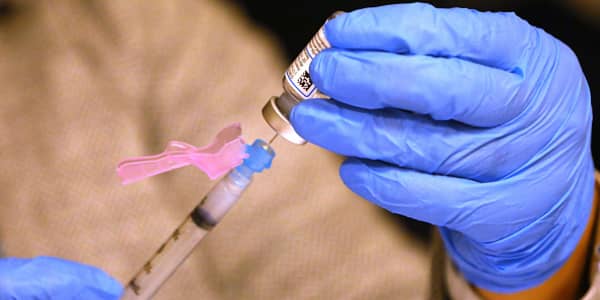The coronavirus pandemic has sped up the rush to e-commerce and digital experiences, according to the chief executive of Lego, as the company announced double-digit growth in consumer sales.
Speaking on a call with reporters on Wednesday, Niels B. Christiansen said visitor numbers to the firm's flagship Lego.com website had doubled to 100 million during the first half of the year, compared to the same period in 2019.
The company's revenue grew 7% to 15.7 billion Danish krone ($2.46 billion) in the six months to June 30, compared to the same period last year, which Christiansen said was due to investments in products, e-commerce, and brand paying off.
"We've actually been investing quite a bit in … longer-term initiatives around strengthening our product portfolio, making it more diverse, touching more passion points (at) different ages, adding more technology," he told CNBC by phone.
Lego reported double-digit consumer sales growth in China, Asia-Pacific, Europe, and the Americas, and operating profit for the group reached 3.9 billion Danish krone for the first half, up 11% on 2019.
But despite the leaps in technology, Lego's digital transformation is at a relatively early stage, Christiansen said.
"The entire Lego ecosystem is actually, I think, only at the beginning. So, it's less about just creating an e-commerce store or an online store. It is really about this entire digital ecosystem and creating that future. And that's a long-term journey, that's a 10-year journey … And we're just a couple of years into this," he told CNBC by phone.
The company's digital platforms include play app Lego Life, which now has more than 9 million users, and the toymaker said it saw a 70% increase in content uploaded by users of its platforms during the first half of the year.
"Serving kids the way we do and having to connect and interact with kids in a world that becomes increasingly digital with all the issues that comes with that in terms of data privacy and creating safe environments for kids, there are many, many, many things we need to invest behind and do and create," Christiansen said.
The Danish family-owned company has outperformed the market, with competitors such as Hasbro suffering after stores closed during the pandemic. Lego is set to open about 120 new brick-and-mortar outlets in 2020, including 80 in China by the end of the year, bringing the total number of Chinese outlets to more than 200.
It launched its Monkie Kid sets, based on the Monkey King Chinese legend, in May, and Christiansen hinted other culturally-based characters may be in the making. "That's an interesting way to also build on, for instance, Chinese culture, or source theme ideas out of cultures and that is something I think in an increasingly diverse and inclusive world is probably one of the ways we can add to that," he told CNBC.
He added that the company had made efforts in what it calls "fluid play," blending physical and digital elements, with physical characters such as Lego Super Mario connected to an app via Bluetooth for example.
"Many of the major trends shaping our industry, such as digitalization and e-commerce, are accelerating as a result of the pandemic. We saw strong growth in digital and traditional play, a rapid shift to e-commerce and the importance of having a truly global operating model," Christiansen said in an emailed release.





